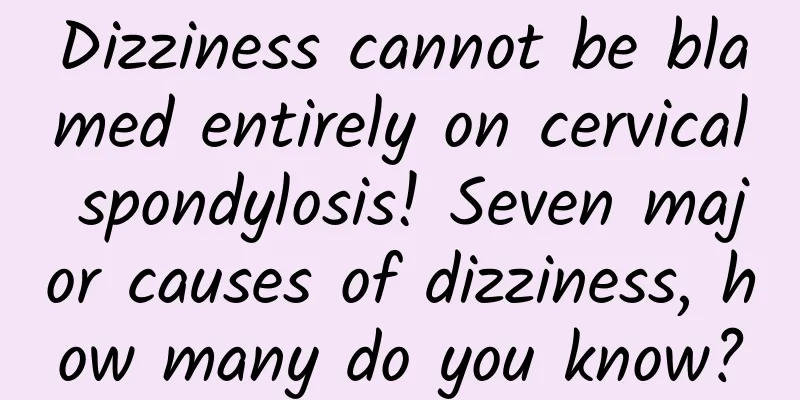Dizziness cannot be blamed entirely on cervical spondylosis! Seven major causes of dizziness, how many do you know?

|
Little A: "Doctor Zhai, I've been feeling dizzy lately, and the X-ray showed that I have bone spurs. Do I have cervical spondylosis?" Doctor Zhai: "You can't just blame cervical spondylosis for dizziness! Why do I say that? Let me first tell you the cause of dizziness, and you'll understand." Common causes of dizziness include: 1. Ear diseases: 1) Otolithiasis: Also known as benign paroxysmal positional vertigo, it is the most common clinical condition and often occurs suddenly. The onset of symptoms is related to the position of the head. When the head is in a certain position, dizziness symptoms like "spinning the world" appear, which lasts for less than 10 seconds and is therefore "fleeting". The dizziness can be alleviated or disappear when the head turns or reverses, and is not accompanied by hearing loss. At the beginning, the dizziness persists, and it will be relieved or disappear on its own after a few hours or days, and become paroxysmal dizziness. 2) Meniere's disease, also known as "Meniere's disease" by the general public, often has symptoms that appear suddenly. Vertigo is at its most severe when the disease first occurs, and worsens when the head moves or when the eyes are opened. The patient often feels like falling, and also has tinnitus, deafness, nausea, vomiting, pale complexion, slow pulse, decreased blood pressure, and nystagmus. The disease occurs intermittently, lasting from a few minutes to a few hours each time, and returning to normal during the intervals. Vertigo gradually subsides as hearing decreases, and disappears when hearing is completely lost. 3) Vestibular neuritis: The main symptoms are vertigo and spontaneous nystagmus, without tinnitus or deafness. Patients often have a history of colds. The vertigo lasts for a short time and generally recovers completely in about 2 weeks. 4) Sudden sensorineural hearing loss with vertigo: In simple terms, it is sudden hearing loss accompanied by vertigo. Hearing loss occurs suddenly and drops to the lowest value within 72 hours, accompanied by vertigo. 2. Neurological diseases: such as cerebellar diseases, brain diseases, brain trauma, certain types of epilepsy, etc. Patients often show other manifestations of neurological damage, such as unsteady walking and weakness. 3. Medical diseases: such as hypertension, hypotension, anemia, hypoglycemia, infection, cold, etc. 4. Drug-induced vertigo: Some drugs may cause vertigo or dizziness, which is mainly seen in some anti-epileptic drugs, antihypertensive drugs, antipsychotic drugs, vestibular inhibitors and some anti-tumor drugs. 5. Psychological dizziness: Patients with depression, anxiety, and tension may also experience dizziness. 6. Vertebral-basilar artery ischemia: mainly posterior circulation cerebral infarction or transient ischemic attack. The severity of the disease varies, and the symptoms are not exactly the same. It can be just mild vertigo, or tinnitus, deafness, etc. 7. Cervical spondylosis: Cervical spondylosis causes dizziness, which may be related to cervical instability or abnormal cervical proprioception. Many patients will suspect that the cervical spine causes dizziness after taking cervical spine X-rays and seeing the report saying that the cervical bone hyperplasia, cervical curvature straightening or cervical spondylosis. However, there is currently controversy about the concept of "cervical vertigo", especially some neurologists or otolaryngologists suggest eliminating this concept. Some doctors believe that it can be regarded as "cervicogenic dizziness" at most, but from the perspective of orthopedic doctors, we do find that many dizzy patients cannot determine the cause after visiting multiple departments such as otolaryngology and neurology, but the patients have abnormal cervical curvature, cervical instability or cervical spondylosis, and the dizziness is relieved after wearing a neck brace, neck muscle exercises or surgery. Therefore, we believe that the possibility of cervical spondylosis causing dizziness cannot be completely denied. In general, dizziness is a very common clinical symptom, but making an accurate diagnosis is a seemingly "simple" yet very "difficult" task. Little A: "Doctor Zhai, I understand a little bit now. But which category should I belong to?" Doctor Zhai: "This can be analyzed in combination with the causes of dizziness we just talked about. For example, when you are dizzy, do you feel "dizzy" or "dizzy"? Do you have nausea and vomiting? Do you have hearing loss, tinnitus, or blurred vision? How are your blood pressure and blood sugar?" Little A: "Doctor Zhai, I don't have severe dizziness, nausea and vomiting, nor do I have deafness, but I didn't have any examination." Doctor Zhai: "Because it is difficult to diagnose the cause of dizziness, I suggest you go to the ENT department, neurology department and other departments first. If they have ruled out other diagnoses, then go to the orthopedics department. After all, the possibility of the cervical spine causing dizziness is very small." Little A: "Thank you, Doctor Zhai. I understand." Doctor Zhai: "Okay, thank you for your understanding. I wish you a speedy recovery." References: Guiding expert: Zhai Jiliang Editor: Liu Yang Zhao Na Proofreading: Li Na, Li Yule, Dong Zhe Producer: Wu Wenming Copyright Statement: Peking Union Medical College Journal advocates respect and protection of intellectual property rights. Reprinting and quoting are welcome, but authorization from this platform is required. If you have any questions about the copyright of the article, please send an email to [email protected] and we will communicate with you in a timely manner. The content and pictures on this website are for reference and learning purposes only, not for profit and are not used as a basis for diagnosis or medical treatment. |
<<: When is guava in season? What does guava taste like?
>>: What is guava? Can guava help you lose weight?
Recommend
Umeng: Analyzing the reasons behind the decline in the proportion of iOS jailbreaks in China
The jailbreaking rate of iOS devices in China has...
Why do you cry when you cut onions? What is the trick to not cry when you cut onions?
Some people can't stop crying when cutting on...
One-third of cancers are preventable. Today is World Cancer Day. Here are 8 key points of cancer prevention and treatment waiting for you!
**Today (February 4)** is "World Cancer Day&...
The best time for women to have children
Many female friends focus on their careers and of...
47-day gestational sac size comparison table
After pregnancy, a gestational sac will be formed...
Anemia range table for pregnant women
When women enter pregnancy, the changes in body h...
What are the dangers of teenage girls staying up late?
Nowadays, teenagers are under increasing study pr...
A life-saving first aid kit must meet these 7 criteria! Check if yours meets the criteria
A friend who knows medicine around you / makes he...
What to do if the vulva is wet and has eczema
Eczema is a relatively common skin disease. It is...
What to do if there are fire bumps on the vulva
Important reminder: Getting angry is one of the m...
How to distinguish true pregnancy from false pregnancy
Many women who are planning to get pregnant have ...
What causes urethral pain in women?
The urethra is a tissue that both men and women h...
What should I do if I have lumps in my breasts during lactation? Simple and effective method
Women may also experience lumps in their breasts ...
How long can you keep the milk at room temperature?
When mothers are breastfeeding, their babies have...
What should pregnant women eat to remove spots?
Women are prone to developing spots on their face...









